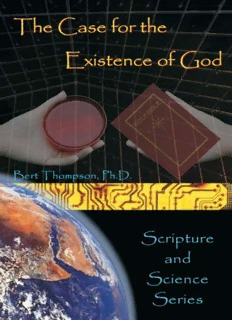
case for the existence of God - Apologetics Press PDF
Preview case for the existence of God - Apologetics Press
APOLOGETICSPRESS Apologetics Press, Inc. 230 Landmark Drive Montgomery, Alabama 36117-2752 © Copyright 2003 ISBN: 0-932859-59-3 Allrightsreserved.Nopartofthisbookmaybereproduced inanyformwithoutpermissionfromthepublisher,exceptin thecaseofbriefquotationsembodiedinarticlesorcriticalre- views. TABLE OF CONTENTS CHAPTER 1 Introduction . . . . . . . . . . . . . . . . . . . . .1 CHAPTER 2 Cause and Effect— The Cosmological Argument. . . . . . . .3 IstheUniverseEternal?. . . . . . . . . . . . . .7 Steady State and Oscil- lating Universe Theories . . . . . . . . . . . .11 DidtheUniverseCreate ItselfOutofNothing? . . . . . . . . . . . . . .25 WastheUniverseCreated? . . . . . . . . . .41 Our Fine-Tuned, Tailor-Made Universe. . . . . . . . . . . . .47 CHAPTER 3 Design in Nature— The Teleological Argument . . . . . . . .67 DesignoftheUniverse. . . . . . . . . . . . . .70 DesignoftheHumanBody. . . . . . . . . .77 The Body’s Cells. . . . . . . . . . . . . . . . . . .78 The Reproductive Methods of Cells. .82 The Genetic Code— Its Design and Function . . . . . . . . . . .86 Origin of the Genetic Code. . . . . . . . .91 DNA, Genes, and Chromosomes . . . .94 The Body’s Tissues. . . . . . . . . . . . . . . .102 The Body’s Organs. . . . . . . . . . . . . . . .106 The Skin. . . . . . . . . . . . . . . . . . . . . . .106 The Eye. . . . . . . . . . . . . . . . . . . . . . .109 The Ear . . . . . . . . . . . . . . . . . . . . . . .113 The Body’s Systems . . . . . . . . . . . . . . .115 The Skeletal System. . . . . . . . . . . . . .115 The Circulatory System. . . . . . . . . . .119 The Nervous System. . . . . . . . . . . . .129 TheUnbeliever’sResponseto theArgumentfromDesign . . . . . . . . .143 -i- CHAPTER 4 Morality and Ethics—the Anthropological Argument. . . . . . . .155 MoralityandEthics . . . . . . . . . . . . . . .158 ThePracticalImpactofMorals andEthicsWithoutGod. . . . . . . . . . . .174 Morals,Ethics,and theExistenceofGod. . . . . . . . . . . . . . .177 CHAPTER 5 Conclusion. . . . . . . . . . . . . . . . . . . . .187 REFERENCES . . . . . . . . . . . . . . . . . . . . . . . . . . . . . .191 -ii- 1 INTRODUCTION Oneofthemostbasic,andmostfundamental,issuesthat canbeconsideredbythehumanmindisthequestion,“Does Godexist?”Inthefieldoflogic,thereareprinciples—oras theyarecalledmoreoften,laws—thatgovernhumanthought processesandthatareacceptedasanalyticallytrue.Oneof theseistheLawoftheExcludedMiddle.Whenappliedtoob- jects,thislawstatesthatanobjectcannotbothpossessandnot possessacertaintraitorcharacteristicatthesametimeandin thesamefashion.Whenappliedtopropositions,thislawstates thatallpreciselystatedpropositionsareeithertrueorfalse; theycannotbebothtrueandfalseatthesametimeandinthe same fashion. Thestatement,“Godexists,”isapreciselystatedproposi- tion.Thus,itiseithertrueorfalse.Thesimplefactis,either GodexistsorHedoesnot.Thereisnomiddleground.One cannotaffirmlogicallyboththeexistenceandnonexistence ofGod.TheatheistboldlystatesthatGoddoesnotexist;the theistaffirmsjustasboldlythatGoddoesexist;theagnostic lamentsthatthereisnotenoughevidencetomakeadecision onthematter;andtheskepticdoubtsthatGod’sexistencecan beprovenwithcertainty.Whoiscorrect?DoesGodexistor not? Theonlywaytoanswerthisquestion,ofcourse,istoseek outandexaminetheevidence.Itcertainlyisreasonableto suggestthatifthereisaGod,Hewouldmakeavailabletous -1- evidenceadequatetothetaskofprovingHisexistence.But doessuchevidenceexist?Andifitdoes,whatisthenatureof that evidence? Thetheistadvocatestheviewthatevidenceisavailableto proveconclusivelythatGoddoesexistandthatthisevidence isadequatetoestablishbeyondreasonabledoubttheexis- tenceofGod.However,whenIemploytheword“prove,”I donotmeanthatGod’sexistencecanbedemonstratedscien- tificallyinthesamefashionthatonemightprovethatasackof potatoesweighstenpoundsorthatahumanhearthasfourdis- tinctchamberswithinit.Suchmattersastheweightofasack ofvegetables,orthedivisionswithinamuscle,aremattersthat maybeverifiedempiricallyusingthefivesenses.Andwhile empiricalevidenceoftenisquiteusefulinestablishingtheva- lidityofacase,itisnotthesolemeansofarrivingatproof.For example,legalauthoritiesrecognizethevalidityofaprimafa- ciecase,whichisacknowledgedtoexistwhenadequateevi- denceisavailabletoestablishthepresumptionofafactthat, unlesssuchfactcanberefuted,legallystandsproven(seeJack- son,1974,p.13).Itisthecontentionofthetheistthatthereisa vastbodyofevidencethatmakesanimpregnableprimafacie casefortheexistenceofGod—acasethatsimplycannotbere- futed.Iwouldliketopresentheretheprimafaciecaseforthe existenceofGod,alongwithasamplingoftheevidenceupon which that case is based. -2- 2 CAUSE AND EFFECT— THE COSMOLOGICAL ARGUMENT Throughouthumanhistory,oneofthemosteffectivear- gumentsfortheexistenceofGodhasbeenthecosmological argument,whichaddressesthefactthattheUniverse(Cos- mos)ishereandthereforemustbeexplainedinsomefashion. In his book,Not A Chance,R.C. Sproul observed: Traditionalphilosophyarguedfortheexistenceof Godonthefoundationofthelawofcausality.The cosmologicalargumentwentfromthepresenceofa cosmosbacktoacreatorofthecosmos.Itsoughtara- tionalanswertothequestion,“Whyistheresome- thingratherthannothing?”Itsoughtasufficientrea- son for a real world (1994, p. 169, emp. in orig.). TheUniverseexistsandisreal.Atheistsandagnosticsnot onlyacknowledgeitsexistence,butadmitthatitisagrandef- fect(e.g.,seeJastrow,1977,pp.19-21).Ifanentitycannotac- countforitsownbeing(i.e.,itisnotsufficienttohavecaused itself),thenitissaidtobe“contingent”becauseitisdepend- entuponsomethingoutsideofitselftoexplainitsexistence. TheUniverseisacontingententitysinceitisinadequateto cause,orexplain,itsownexistence.Sproulhasnoted:“Logic requiresthatifsomethingexistscontingently,itmusthavea cause.Thatismerelytosay,ifitisaneffectitmusthaveanan- -3- tecedentcause”(1994,p.172).Thus,sincetheUniverseisad- mittedlyacontingenteffect,theobviousquestionbecomes, “Whatcausedthe Universe?” ItisherethattheLawofCauseandEffect(alsoknownas theLawofCausality)istiedfirmlytothecosmologicalargu- ment.Scientists,andphilosophersofscience,recognizelaws as“reflectingactualregularitiesinnature”(Hull,1974,p.3). Sofarasscientificknowledgecanattest,lawsknownoexcep- tions.ThiscertainlyistrueoftheLawofCauseandEffect.It is,indisputably,themostuniversal,andmostcertain,ofall scientific laws. Thislawhasbeenstatedinavarietyofways,eachofwhich adequatelyexpressesitsultimatemeaning.Kant,inthefirst editionofCritiqueofPureReason,statedthat“everythingthat happens(beginstobe)presupposessomethingwhichitfollows accordingtoarule.”Inthesecondedition,hestrengthened thatstatementbynotingthat“allchangestakeplaceaccording tothelawofconnectionofcauseandeffect”(seeMeiklejohn, 1878,p.141).Schopenhauerstatedthepropositionas:“Noth- inghappenswithoutareasonwhyitshouldhappenratherthan nothappen”(asquotedinvonMises,1968,p.159).Thenum- berofvariousformulationscouldbeexpandedalmostindef- initely.Butsimplyput,theLawofCausalitystatesthatevery materialeffectmusthaveanadequateantecedentcause. Thephilosophical/theologicalimplicationsofthisconcept— proandcon—havebeenarguedthroughtheyears.Butafter thedustsettles,theLawofCausalityalwaysremainsintact. Thereisnoquestionofitsacceptanceintheworldofexperi- mentalscienceorintheordinaryworldofpersonalexperi- ence.Manyyearsago,professorW.T.Stace,inhisclassicwork, A Critical History of Greek Philosophy, commented: Everystudentoflogicknowsthatthisistheultimate canonofthesciences,thefoundationofthemall.If wedidnotbelievethetruthofcausation,namely,ev- erythingwhichhasabeginninghasacause,andthat -4- inthesamecircumstancesthesamethingsinvariably happen,allthescienceswouldatoncecrumbleto dust.Ineveryscientificinvestigationthistruthisas- sumed (1934, p. 6). TheLawofCausalityisnotofimportancejusttoscience. RichardvonMisesobserved:“Wemayonlyaddthatalmost allphilosophersregardthelawofcausalityasthemostim- portant,themostfar-reaching,andthemostfirmlyfounded of all principles of epistemology.” He then added: Thelawofcausalityclaimsthatforeveryobserv- ablephenomenon(letuscallitB)thereexistsasec- ondphenomenonA,suchthatthesentence“Bfol- lowsfromA”istrue....Therecanbenodoubtthatthe lawofcausalityintheformulationjuststatedisin agreementwithallourownexperiencesandwith thosewhichcometoourknowledgeinonewayor another....[We]canalsostatethatinpracticallifethere ishardlyamoreusefulandmorereliableruleofbe- haviorthantoassumeofanyoccurrencethatwecome toknowthatsomeotheroneprecededitasitscause (1968, p. 160, emp. in orig.). RichardTaylor,addressingtheimportanceofthisbasiclaw of science inThe Encyclopedia of Philosophy, wrote: Nevertheless,itishardlydisputablethattheideaof causationisnotonlyindispensableinthecommon affairsoflifebutinallappliedscienceaswell.Juris- prudenceandlawwouldbecomequitemeaningless ifmenwerenotentitledtoseekthecausesofvarious unwantedeventssuchasviolentdeaths,fires,andac- cidents.Thesameistrueinsuchareasaspublichealth, medicine,militaryplanning,and,indeed,everyarea of life (1967, p. 57). JustastheLawoftheExcludedMiddle(discussedinchap- ter1)istrueanalytically,sotheLawofCauseandEffectis trueanalyticallyaswell.Sprouladdressedthiswhenhewrote: -5-
Description: